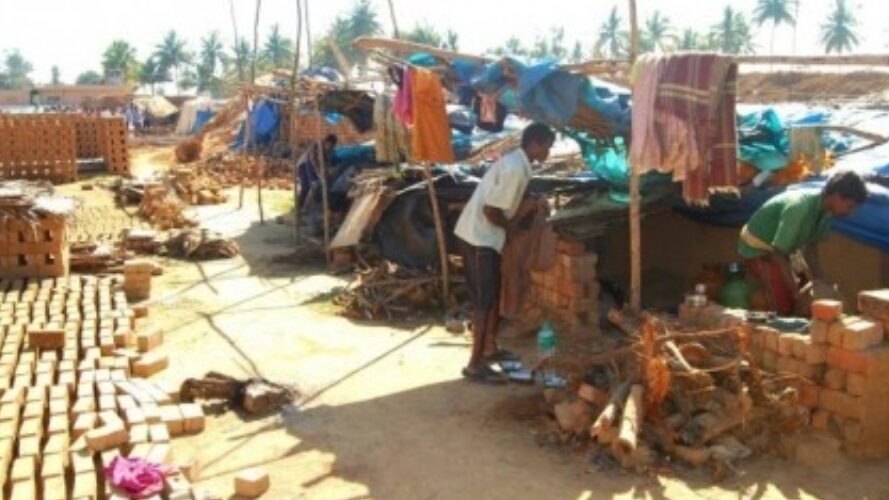Four Convicted in Bangalore, Setting New Milestone for IJM’s Anti-Slavery Work
Slavery
Last week, an Indian court made great strides in protecting the poor by convicting two brick kiln owners and two supervisors who had forced families—including children as young as 5—to work as bonded laborers.
The four accused had been arrested by local authorities in two separate IJM cases. These men had lured poor families with promises of good jobs and fair pay. Instead, the laborers and their children were trapped with violence and forced to work as slaves in order to pay off an ever-growing false debt.
“Large advances are no reason to hold someone against their will,” says Sashmeeta Mulmi, legal director with IJM in Bangalore. “The key is whether this obligation has resulted in their exploitation or their freedom being restricted.”
Courts saw the clear exploitation that had taken place in these cases and, on Friday, January 29, found the kiln owners and supervisors guilty under multiple sections of India’s Bonded Labour System (Abolition) Act of 1976. By Monday, they were sentenced to two years of imprisonment and ordered to pay a fine for their crimes.
Case 1: Threats of Violence Kept Families in Fear
It was just days before Christmas in 2012 when government officials and IJM staff rescued 61 women, children and men from a brutal brick factory where they had been held in bonded labor slavery.
Entire families were trapped in this kiln, with even children as young as 5 forced to turn the heavy bricks. The laborers were never allowed to leave and could not even go to the toilet without being watched. They endured beatings and violent threats—even being threatened with electrical shocks—if their work did not meet the owner’s standards.
On the night the rescue team arrived to free them, it became clear this abusive kiln owner had heard about the government’s plans: All eight children had been hidden away. Parents fell to their hands and knees before the officers, begging to be set free and to get their children back. The officials were deeply moved and worked tirelessly to question the owner, eventually reuniting the families and bringing them all to safety.
Case 2: Owner Confined Laborers to a Tiny Shed
The second case came from another brick kiln rescue in March 2014, when IJM met a woman desperate for help for her family members held by the controlling kiln owner for over a year.
These four adults and three children worked nearly 14 hours each day making and hauling heavy bricks. The owner watched them constantly, and frequently beat these workers when they faltered. When they were not working, the families were confined to a small shed.
When one laborer attempted to escape the kiln, the owner tracked him down, dragged him back, and locked him in a room for two days as punishment.
Our IJM team worked with government officials and local police to investigate the kiln and soon conducted a rescue operation to free all seven people. The rescued laborers shared the truth boldly in their official statements and quickly received the medical care and warm meals they needed.
The rescued families in both cases joined IJM’s two-year aftercare program. Social workers helped them return to their home villages and have met with the families often for skills training and ongoing support as they build new lives in freedom.
Significant Progress in the Ongoing Fight against Slavery
Historically, convictions in cases like these have been difficult in India’s court system. Officials are often hesitant to bring charges against wealthy business owners who mistreat the poor, and unreliable evidence gathered by untrained police often fails to sustain a strong prosecution.
IJM’s team in Bangalore has worked with officials since 2006 to combat bonded labor slavery and improve the way police and courts uphold justice for the poor. They have collaborated closely with the Anti-Human Trafficking Police to rescue hundreds of children and families over the last few years.
“Convictions for bonded labor crimes have been rare,” says Esther Daniel, IJM’s director of justice system engagement in Bangalore. “But through strong sentences in [these recent judgments], the Court emphasized the seriousness of the crime and brought the perpetrators to justice quickly and decisively.”
These recent convictions are significant because each step of the trial process functioned correctly. Victims showed perseverance and bravery while testifying in court. Public prosecutors showed compassion for the victims and were proactive throughout. The judge was constantly engaged during the trial, and was meticulous in his duties. He ensured that every statement of testimony was recorded, and his judgment demonstrated strong adherence to the letter of the laws against bonded labor in India.
These convictions demonstrate how the police and court systems can provide justice for the poor and vulnerable, and how perpetrators of bonded labor slavery can expect to be punished.
“This is just the beginning of the tipping point,” Esther adds. “Meaningful sentences and effective enforcement of the law will little by little—but surely—build safe communities and protect the poor from violent crimes like bonded labor slavery.”